Key takeaways:
- Attending writer conferences fosters genuine connections with fellow writers and provides a supportive community that encourages perseverance in the face of challenges.
- Preparation is essential; setting specific goals and researching speakers can enhance the conference experience significantly.
- Networking effectively involves showing genuine interest in others and following up after the conference to maintain relationships that can lead to future collaborations.
- Maximizing resources such as one-on-one consultations and online materials can deepen learning and inspire creative growth after the event.
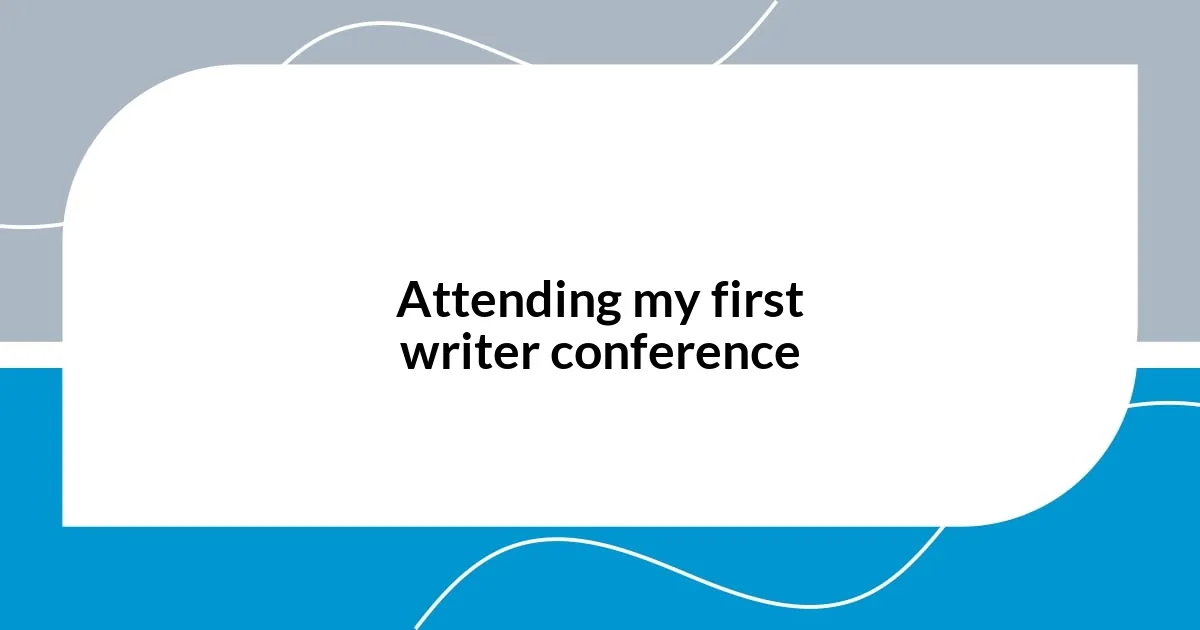
Attending my first writer conference
Walking into my first writer conference felt both exhilarating and terrifying. I remember my heart racing as I scanned the room filled with seasoned authors and fellow aspiring writers, all sharing ideas and laughter. Was I really supposed to be here amid such talent?
I vividly recall sitting in on my first workshop, where a published author shared their journey. Their candid tales about rejection and perseverance struck a chord with me. At that moment, I thought, “If they can overcome obstacles, so can I.” It’s those real-life stories that broke down my insecurities and made me realize I wasn’t alone in my struggles.
By the end of the weekend, I found myself surrounded by new friends who understood my passion for writing. We exchanged contact information and support, promising to keep each other motivated. Isn’t it amazing how a shared passion can create such genuine connections? This was more than just a conference; it was the start of a priceless community for me.
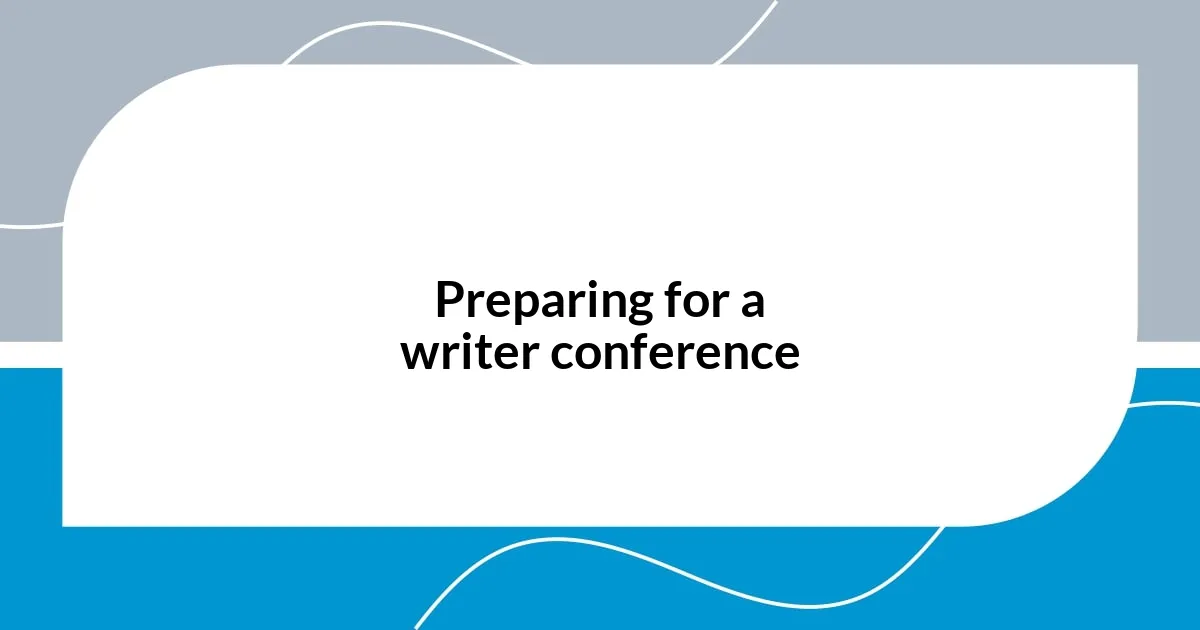
Preparing for a writer conference
To prepare for a writer conference, I found it crucial to set specific goals. I used to just show up without a clear purpose, but I quickly learned that having a focus can vastly enhance the experience. Whether it’s refining my pitch, networking with agents, or simply gathering tips on self-publishing, clarity makes the journey smoother.
Here are a few things to consider before you go:
- Research the speakers and sessions that interest you.
- Prepare your elevator pitch to maximize networking opportunities.
- Bring plenty of business cards to share your details easily.
- Pack a comfortable notebook and pen for jotting down insights.
- Dress in layers; conference centers can vary widely in temperature.
Taking the time to prepare not only helps to ease any pre-conference anxiety but also transforms the whole experience. On my second conference, I made a plan based on my previous encounters, and it made a world of difference—I felt more confident and engaged with the content.
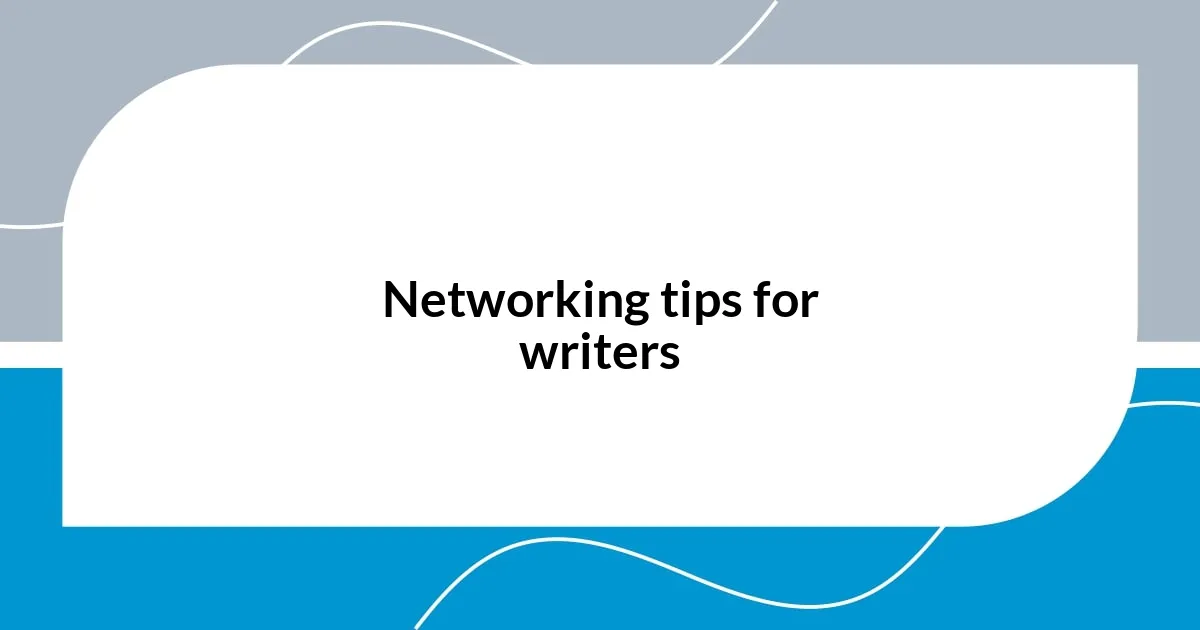
Networking tips for writers
Networking can feel daunting, especially when surrounded by accomplished writers, but I’ve discovered a few tips that really make a difference. One powerful strategy is to approach conversations with genuine curiosity. Instead of worrying about making a perfect impression, I focus on asking questions about others’ writing journeys. It’s amazing how this not only eases my nerves but also leads to deeper connections. For instance, during my last conference, I asked a fellow writer about their favorite genres, and our conversation flowed effortlessly, resulting in a collaboration idea we’re now exploring!
Another insight I’ve gleaned over multiple conferences is the value of follow-up. After meeting someone, I make a point to send a quick email or message, referencing our conversation. It’s a simple gesture, but it shows that I value the connection we made. In my experience, reaching out a week later has often led to invitations to write together or participate in local events. It’s a straightforward way to keep the momentum going, and I can’t stress how much it’s helped build lasting relationships.
Lastly, don’t underestimate the power of social media in this process. After a conference, I typically share photos and insights through my platforms. It not only showcases my experience but also enables me to tag those I’ve met, encouraging further interaction. I remember one conference where I tweeted about a panel, leading to a meaningful exchange with a panelist, which opened doors later down the line. So, as you navigate the bustling world of networking at writer conferences, remember these tactics; they might just be the keys to unlock fruitful connections!
| Tip | Description |
|---|---|
| Ask Questions | Show genuine interest in others’ writing journeys to ease nerves and build real connections. |
| Follow-Up | Send a message after the conference to acknowledge the connection, which can lead to future collaborations. |
| Utilize Social Media | Share your experiences online, tagging new acquaintances to foster ongoing engagement. |
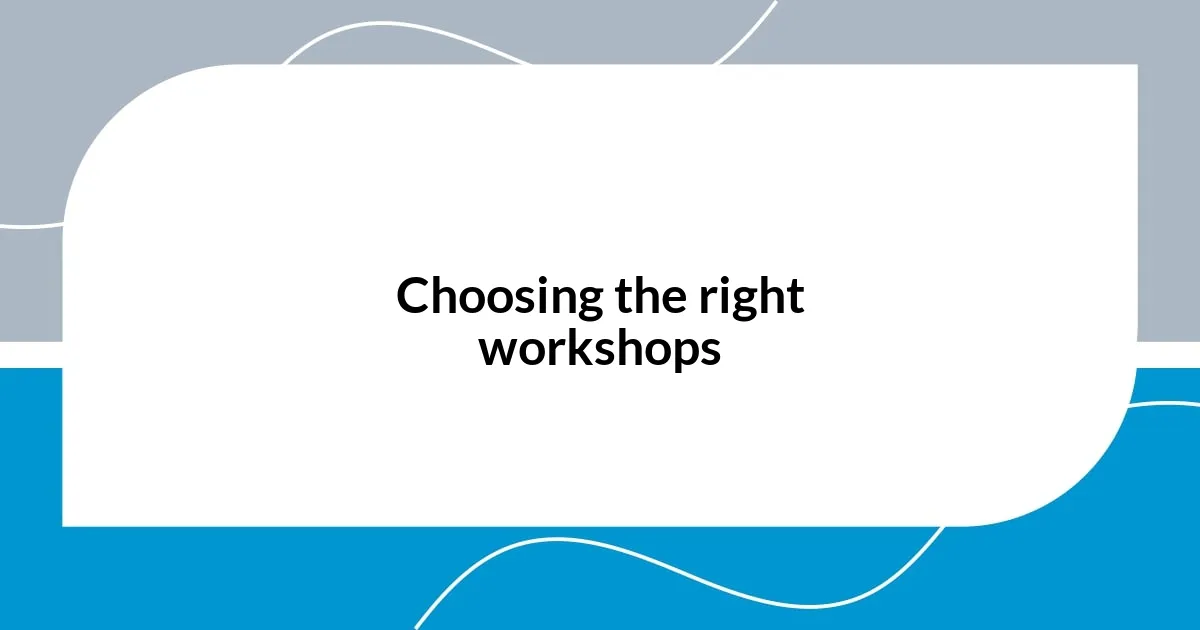
Choosing the right workshops
Choosing the right workshops at a writer conference can feel overwhelming, especially with so many options on the agenda. I remember my first conference when I randomly chose sessions based on catchy titles. Some ended up being great, but others left me feeling unfulfilled. Now, I take the time to align workshop choices with my personal goals, whether it’s learning about character development or mastering the art of dialogue. Trust me, this approach has led to much richer experiences.
As I sift through available workshops, I also consider the speakers’ backgrounds and their areas of expertise. At one conference, I chose a session led by an author whose work I deeply admired. The insights I gained were not just about technique but also about resilience in the writing process. How often do we get the chance to connect directly with someone whose journey inspires us? I make a point to seek out those opportunities, knowing they can spark creativity in my own writing.
Engagement doesn’t end with the workshop itself. I’ve learned to participate actively, whether by asking questions or sharing my thoughts during discussions. One time, I voiced a concern about my character’s motivations at a workshop. Surprisingly, the feedback from both my peers and the instructor helped me reshape my story into something I felt genuinely excited about. Have you ever had an “aha” moment in a conference setting? Those moments can be transformative, and they often stem from being fully invested in the workshop experience.
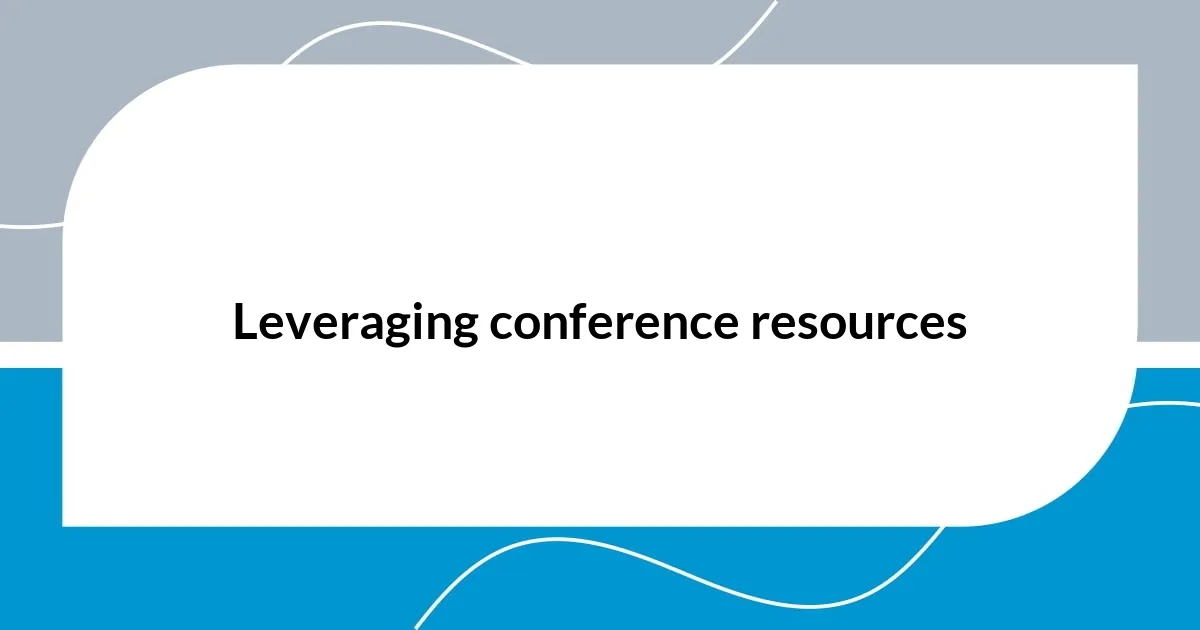
Leveraging conference resources
I can’t stress enough the importance of maximizing the resources available at writer conferences. One often-overlooked treasure is the resource center, where you can find an abundance of materials, from publishing guidelines to lists of literary agents. I remember discovering a pamphlet that provided tips on self-publishing, which wasn’t initially on my radar but has since opened up numerous possibilities for my work. It’s like uncovering hidden gems that can shape your writing journey.
Another valuable resource is the scheduled one-on-one consultations with established authors and agents. I eagerly signed up for a session with a literary agent at my last conference, and it turned out to be a game changer. During our conversation, I shared the premise of my novel, and the feedback was not only constructive but also encouraging. Has a conversation ever shifted your perspective on your work? Moments like these reinforce the importance of utilizing every opportunity available, as they can lead to invaluable insights and connections.
Additionally, I always make sure to explore the conference’s online platform, where recordings and materials from sessions are often available after the event. This tool has become my lifeline, especially when I’m juggling multiple sessions. After my last conference, I revisited a workshop on the art of storytelling. I found myself jotting down fresh ideas that I had missed in the live setting, deepening my understanding of the craft. What’s more satisfying than having a rich resource waiting for you to dive back into? Embracing these resources can supercharge your learning and ensure you leave the conference feeling inspired and equipped.
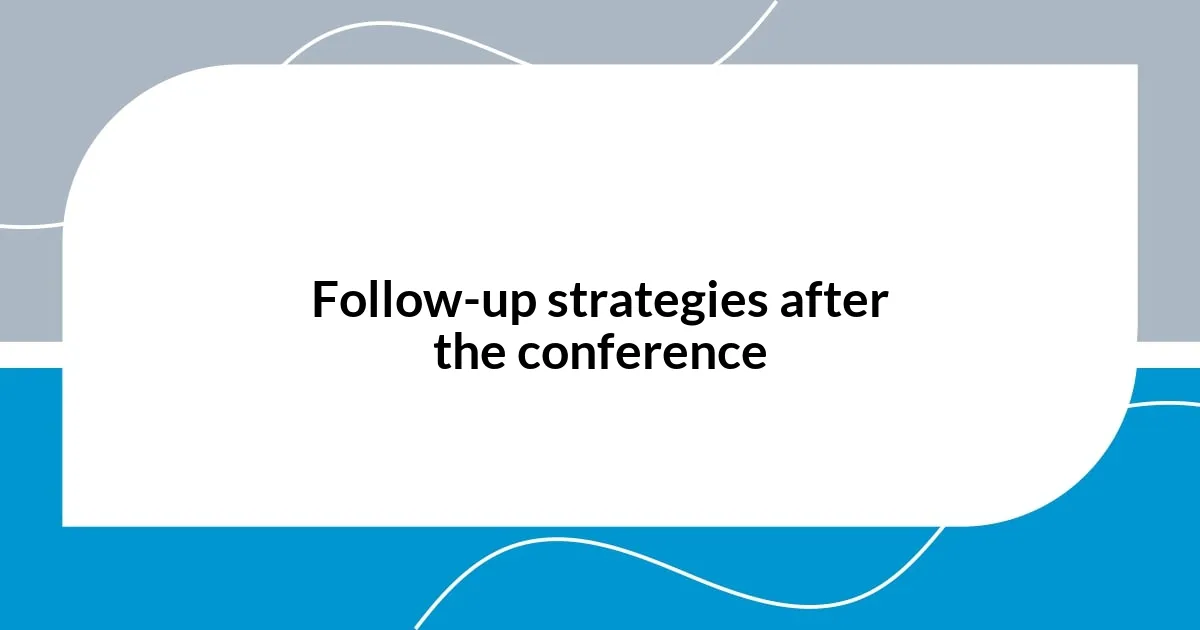
Follow-up strategies after the conference
Following up after a writer’s conference is crucial for making the most of the connections and insights you’ve gathered. I recall returning home and logging into my email, full of enthusiasm to reach out to the authors and agents I had met. It was overwhelming, but I focused on sending personalized thank-you notes to those who inspired me. This small gesture not only nurtured those budding relationships but also made me feel more grounded in a world that often feels chaotic.
In my experience, it’s not just about sending emails—social media is a powerful tool. After a conference, I committed to following attendees and speakers on platforms like Twitter and LinkedIn. I remember engaging in a lively discussion about character arcs with an author I’d met. This exchange turned into an ongoing dialogue that fed my creative spirit. Have you ever thought about how social media can transform connections into lasting friendships? I’ve learned that, when used well, these platforms can deepen our engagement and broaden our network in unforeseen ways.
Another strategy I found helpful is revisiting the notes I took during the sessions. Shortly after one conference, I sat down with my notebook, recalling the excitement of the workshop where I learned about the importance of voice in storytelling. As I reflected and applied those lessons, I felt a surge of inspiration wash over me. Did you know that revisiting your notes can spark new ideas? For me, it didn’t just reinforce what I learned; it also opened doors to fresh concepts that I am still exploring in my writing today. Embracing post-conference reflection can truly enhance your creative journey.
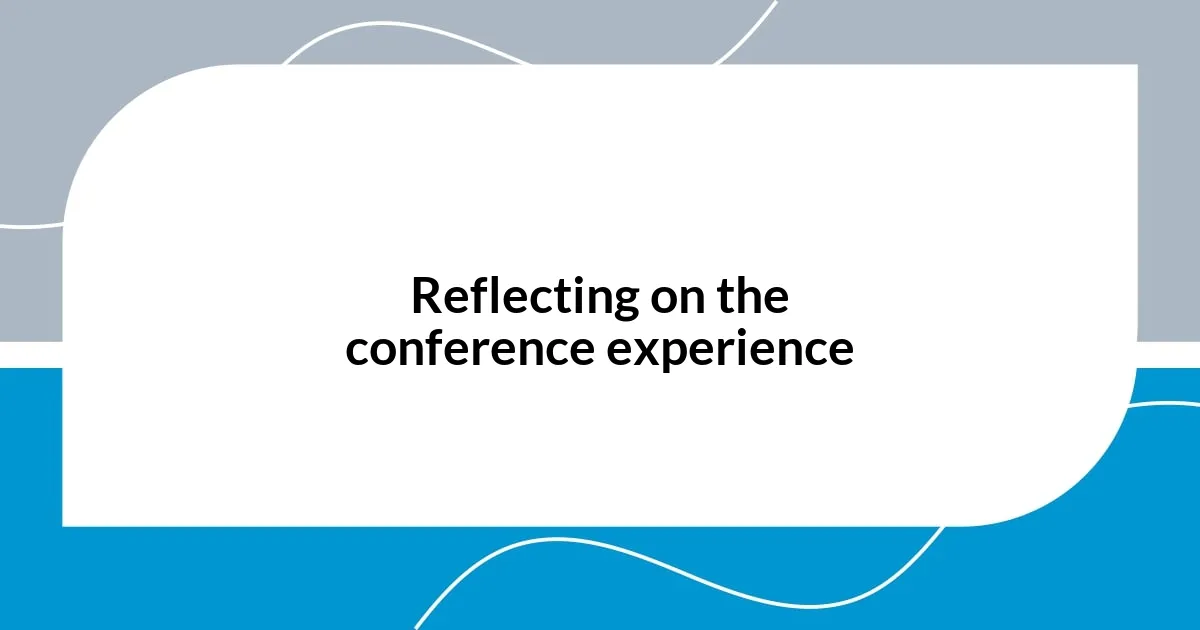
Reflecting on the conference experience
Reflecting on my experience at writer conferences always brings a flood of emotions. I vividly recall the moment I sat in the hallway after a particularly impactful session, surrounded by fellow writers buzzing with excitement. We exchanged thoughts on what we had learned, and I realized just how valuable it is to share our reflections. Isn’t it fascinating how a simple conversation can crystallize your understanding of a topic? For me, those discussions often solidified my takeaway points and inspired new ones.
As I think back, I also remember grappling with self-doubt during my early conference days. At one event, I felt intimidated listening to accomplished authors talk about their journeys. Yet, by the end of the day, I found a sense of camaraderie with others who shared my insecurities and aspirations. That’s when it hit me—the power of vulnerability in a room full of creatives. Have you ever felt like you didn’t belong, only to discover that everyone else felt the same? Realizing that we’re all in this together strengthened my resolve to pursue my writing goals.
I often reflect on the unique energy present at these conferences; it’s both invigorating and grounding. There’s something about being surrounded by like-minded individuals who share a passion for storytelling that rekindles my motivation. After one memorable keynote, I appreciated how the speaker’s journey mirrored my own in many ways. It left me pondering a crucial question: what does it take to stay true to your voice in a crowded room? Embracing that sense of community has transformed how I view my craft and connected me to a support network that continuously inspires me on my journey.